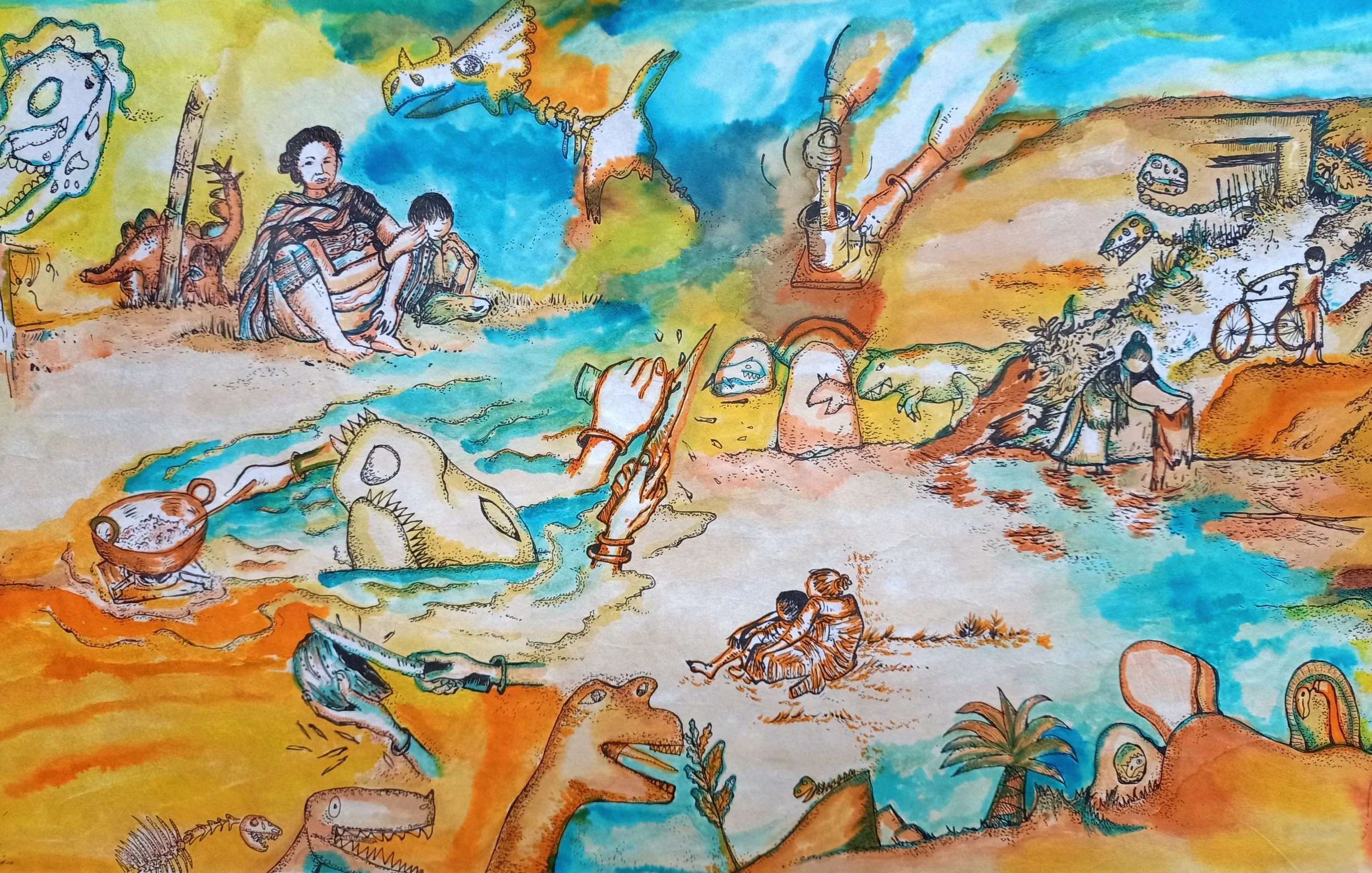Guitar Beneath the Stairs
By Shikhandin
When she was young and had faith, she would let her mind meander among the pathways of dreams, seeing a future where she was not her.
Now, she has the guitar. The guitar was a discard.
She reaches for it and clasps its silence to her heart. Tears would have been an option, except that they dried up a long time ago. She sits in the dark with the guitar. With her eyes closed, imagining the other. She imagines her in her new home, her new man, her new life. And she begins to remember.
Raqs Media Collective, Cavalcade (still), 2025. Digital video projection. Courtesy of the artists and Frith Street Gallery, London
Image description: A dark sillouette of a man against an infra-red (pink) ground, standing before a pool of greenish water; line drawings superimposed on the water.
*
She and her. They were sisters, fathered by the same man. Just two years apart. And yet they were not sisters. Not in the real sense of the word. What they shared was physical space. Separate lives in the same house.
She always seemed to be hovering on the edge, like a shop assistant. But she was happy to do that. She liked to watch her elder sister when she went out. She would stay out of sight and follow her sister and her boyfriend.
The two of them enjoyed walking by the long road that ran alongside the river which looped and straightened as it flowed beside the city where their parents had bought a house to begin their conjoined life afresh and raise their children. She would watch them engulfed by the sunset, their silhouettes aflame. Her sister leaning a little towards him, an unconscious body language announcing they were a pair. And he, he would be tilting his head away so his eyes could fall full on her face as they talked. His long legs striding forward. The edges of his jeans slapping around his thin ankles, his sandaled feet.
The boyfriend had an intellectual’s beard on his narrow face. He carried a guitar slung across his back. They liked to sit on one of the stone benches on the riverbank. He would strum the guitar thoughtfully as she shuffled the pages of her notebook and sang some lines from a song she had composed. They would converse in low tones, shutting out the world. Her laughter would come floating towards the other like the teasing flight of a spring butterfly.
She, the eternal other, suspected her sister was serious about him. She had never met him, so she could not be sure. Her sister never introduced her to any of her friends. Not one, not once.
They had a brother. He and her sister were close. He knew her friends, even her boyfriend. She once overheard them whispering about bringing him home to meet the parents. She heard him mentioning her name. She heard her sister snort. He mumbled something about a hotel or a club, and she said okay, that would do. The boy was coming to meet the parents, she guessed, but couldn’t be sure.
One time, when they were in elementary school, her sister went picnicking with her classmates near the school pond. She insisted that it was a class thing, but the other girl followed them anyway. When they looked at the intruder with raised eyebrows, she sat with her back towards them on the bench facing the water lilies. She could smell the cake they were eating, baked that morning by their mother. She heard the pop of soda bottles and the crunch of potato chips. They let her sit, but did not offer her anything. They talked and joked amongst themselves, her sister laughing louder to cover up her embarrassment. She sat there alone long after they had left, getting up only when the school bus arrived and honked impatiently. Her sister was looking flustered when she finally reached the bus, but did not say a word to her.
Her sister sang well. She gave credible renditions of Barbara Streisand and Joan Baez. She was often asked to sing at school and college festivals. She always sang loudly and freely in the bathroom. She, the other, would hang around outside the bathroom when her sister sang, sometimes with her eye on the crack where the door hinge met the frame.
Sometimes her sister would sing two lines from a song she was composing, over and over again. The other would guess that she was stuck for inspiration. An idea would strike her, and she would edge eagerly forward, and tap on the bathroom door. But her sister, as if sensing what was on the other’s mind, would scream at her to go away.
She loved her sister’s songs. She hummed them as she went about doing the housework. Occasionally, she caught their mother looking at her. It was hard to decipher what her mother was thinking. Her father did not seem to notice her, or he thought she was someone else, a distant relative who had nowhere else to go.
Why were they like that? The question did not strike her. This is how it had always been, ever since she could remember. She was used to it. Sometimes she herself forgot who they were to her. And then she would remember, and weep into her pillow. But those days of pillow-wetting were long over by the time she was in her teens. As a child she had believed, because of something her sister had told her, that she was a foundling they were raising. But as she grew older, and noticed the strong physical resemblance between her father and her, she knew. For once she was certain, she had been lied to. Not that it changed anything.
“Patriarchy frowns upon abortion. And yet patriarchy turns its back on the child born out of wedlock. The husband’s infidelity becomes the wife’s responsibility. Why? Is it because the wife is afraid? Is she another casualty of patriarchy? Or does she blame herself for his follies? Be that as it may. Patriarchy establishes a firm pecking order. Patriarchy demands absolute subordination from those lower down. Patriarchy rules. Patriarchy sucks!” Her sister had written these words down in her diary. The other thought the lines were profound. She thought her sister was writing a poem or another song. She wondered when her sister would set it to music.
One day, when she was still in college, she went up on stage and sang one of her sister’s songs during an arts festival in their department. Her sister was livid.
“I forbid you!” she said, her eyes blazing. “Do not ever sing my songs again! Do you hear me? Never!”
The people milling around the campus stared. Some snickered. A festival in any department drew large crowds. Her sister turned on her heels and started to walk away with her friends. Then, she turned around again suddenly. “You! You cannot even sing to save your life!”
The other’s ears burned as if a hot iron had been pressed against them. She went to the lake on the university campus and sat down on a grassy spot. The water rippled softly in the breeze. She stayed there for a long time. But it was no use. Her body felt like a doll carved from bamboo. She could hear the wind whistling eerily through her hollowed-out head.
Why did her sister hate her so much? Why did she want to be with her sister so much? It didn’t make any sense. Hate should be reciprocated with hate. Maybe she did hate her. And that was why she wanted her. Maybe, she thought, both were driven by events they could not be held responsible for. And that their feelings were instinctive, more animal in nature. Be that as it may, a miracle shortly occurred and gave her hope. It was as if a dark angel had answered her desire.
Her sister collapsed with pain one day. She lay in bed moaning and writhing. They rushed her to the hospital. The doctors said there was something in her uterus. They said she had had the condition since she was a baby girl. And that they should have had her checked much earlier. The thing inside her had burst and was turning her insides toxic. They said that they needed to operate immediately.
The other was elated and frightened at the same time. It was the same feeling that she used to get before her exams: Elation that the exams heralded the end of another academic year, and fear that she would not get through despite all her hard work. The fear was not baseless. She had a habit of panicking when the question paper was placed before her. The more she panicked the less her mind responded. The less her mind responded, the more she panicked. Ultimately, she never managed to finish college.
This time though, she was determined to succeed. It was almost like she had prepared herself for this very test her entire life. She cooked healthy broths for her sister and washed her nightclothes. She borrowed audio books from the library for her to listen to. She bought flowers for her from money she saved from trips to the grocers. The nurses thought she was a wonderful sister. She felt genuine happiness in her heart when she heard them praise her. One day, she worked up courage and offered to call up her boyfriend so he could come to the hospital to see her. Her sister looked at her disdainfully. She scoffed.
“I’m sick, not dumb.”
“I was only trying to help.”
“Don’t.”
“Don’t you want to see him?”
She turned her face away. The curve of her cheek bones caught the light from the bedside lamp. It looked like a large teardrop. Her long eyelashes created a fan shaped shadow on the wall.
Raqs Media Collective, Cavalcade (still), 2025. Digital video projection. Courtesy of the artists and Frith Street Gallery, London
Image description: Drawing of a sunken two-masted ship beneathe blue-green waters; a bright illustration of a turtle in the foreground (lower-right corner).
Later that night, she went into her sister’s room and searched through her sister’s things. Her handbag, her bookshelf, her cupboard. At last, tucked away between a box of sanitary napkins and old night clothes, which she never seemed to want to discard, she found a small telephone book. Her sister had this quirky habit of keeping numbers written down in several little notebooks.
The other girl was nervous, despite having rehearsed the meeting so many times in her mind. Phoning him had been easy enough. And he would come, she was quite certain. How could a man refuse a sick woman? But now that she was about to meet him in the flesh, her legs refused to move. Her tongue felt coated with sawdust.
“What went wrong?” he said, breaking the silence. “What really happened?”
They were sitting at the reception room of the boarding house where he stayed. The curtains were stained and the room stank of cigarettes, beer, and stale food. The floor was littered with stubs.
“She has an abnormality there,” the other replied. “The doctors had to operate. I’m not sure she is a whole woman anymore.”
“Wha-at?”
“It was something she had when she was small, around two- three-years-old. A growth inside. Our parents didn’t know. Nobody suspected anything even when she reached puberty,” she sighed. After a pause, in which she seemed to hesitate, she spoke again. “I can’t say whether the operation will be successful or not. The doctors say she will probably be okay afterwards, even if she isn’t alright there. We hope she will. Will you see her?”
“Uh? Yeah. Sure.”
“You could bring your guitar. That would be nice.”
“Mmm, sure.”
“It would be nice to hear you play,” she murmured after another pause. It was a longer pause, in which she almost trembled with emotion.
Her heart was hammering. She was a poor substitute, she knew, didn’t she? Would he respond? He was a man after all. Men have their needs. And she was that alms woman at the temple door. The supplicant before the priest, eager to receive yesterday’s offerings to the goddess.
Afterwards they wrapped themselves in their separate shrouds of silence. Words were not just unnecessary, they were potential robbers of something so precious it could not be named. She would rather die than give up the treasure, however ill-gotten.
She saw him again, a few more times. He always asked about her sister. He looked shamefaced, when she told him how sick she was, and so often in a bad temper.
Despite their meetings, the boyfriend managed to maintain a certain distance. He seemed detached when he was with her. Two bodies touching like two boats in a river, grinding against each other during the exchange of whatever it was that needed to be exchanged, and then moving away. Ploughing through the water to meet their separate destinies. It disconcerted her. But she was also grateful.
He gave her his guitar the last time they met.
“I got an offer from an overseas shipping company. I am sailing tomorrow,” he said. “Remember to give her the guitar, please. She used to compose her songs on it. In a way it is really hers. I would like her to have it. I am sorry. Tell her. Please, tell her, I…”
He spoke sadly. He never finished what he had wanted to say. Still, it was the longest that he had ever spoken to her. She held the guitar to her nose and inhaled deeply. It smelled of the cigarettes he used to smoke. He would hold one between his index and middle fingers and blow the smoke into the gap without taking his hand away from his mouth, until the smoke formed a screen before his face.
She hid the guitar beneath the stairs in their house, where they kept things that nobody needed, but couldn’t discard. She fingered it whenever she was alone in the house. Once her sister’s surgery was over and she was well enough to return home, she told her about the guitar. Her sister did not scream. She did not create a scene.
“Bitch!” she said in a cold and quiet voice. “You keep it!”
A year later, her sister moved to a city in another country. She spoke with her brother, mother, and father regularly. They never talked when the other was in the house. But she understood. Conversations at the dining table, that never included her, invariably circumambulated the topic of her sister and her new life. Sometimes they completely forgot she was there, and discussed her sister animatedly, with joy and pride, before noticing her and falling silent.
A few years later the brother got a job in a large computer company. Shortly afterwards, he married a nice girl. She and the other became good friends for a while. But he got a transfer to another city. Her mother and father went to live with them soon after. They gave her the house before they left.
“This is all we can do for you,” they said. “Try and have a good life.”
She had a life, and there was a lot of it left to live. Perhaps they wanted her to be grateful that they had provided for her. She was. It could have been worse.
She changed the nameplate on the door. She rearranged the furniture. She began to walk along the river, that long road, whenever she got a chance. The breeze from the river freed her mind. She would imagine herself to be her sister. She would walk the way her sister used to, and let her hair hang down like hers.
When she swayed and sashayed down the riverbank, she felt she had become her sister, and living her life. And then she began to imagine it was him walking beside her, guitar slung across his back.
Sometimes there really would be someone walking along by her side. Whenever that happened, she would just close her eyes and let her fingers brush against that person’s hand, until they reached a secluded spot. Then she would close her eyes all over again. It did not seem to matter who was who, and what was what. Her mind and body were different creatures that happened to be travelling on the same path.
Raqs Media Collective, Cavalcade (still), 2025. Digital video projection. Courtesy of the artists and Frith Street Gallery, London
Image description: The tiny silhouette of a man atop a great expanse of volcanic rock, gazing at a fiery apocalyptic sky.
*
The days she left behind have no names. She has forgotten why they had existed in the first place. For whose pleasure? The strands of grey in her hair, the popping of joints are reminders that time has flown like a river in spate, since her last rendezvous.
The city is now a stranger to her. It unfolds and unwraps around her like she is a boulder in its path, and it no longer knows her. The river gave up on the city years ago, the way a woman does when there are too many men surrounding her or when the fight has been beaten clean out of her. The river is a dry bed now with the bones of tender aquatic creatures bleaching in the sun. A brittle wind blows every day, carrying in its arms the cries of hostile creatures.
This city used to be her city too. Not only her sister’s. Even though it cares so little for her. Even though the only season it acknowledges is summer, accepting the heat and dust and the unquenchable thirst of its people as offerings. But the city ignores the house she lives in. Her house is cold. Witheringly cold. It even shuns her own body’s heat. Questions rise like restless spirits and hum their discontent between the walls and the ceiling. But the answers are rudderless boats, drifting away. It is no use.
When it all gets too much for her, she reaches for the guitar. It is still swaddled in a cotton sheet, and dusty like the other discards that nobody had the heart to toss out when they lived together — her sister, brother, mother and father and her.
The guitar had hidden itself away, like her.
Now she sneezes as she pulls it out. She unwinds the rotting fabric gently. Beneath the cobweb, the guitar’s strings gleam like distant lights trailing dark river waters. The memory of a tune runs on them — an acrobat on sagging ropes.
Her fingers are too arthritic to strum. So, she lets them rest. She lets the music run freely down her mind. The lyrics of her sister’s songs, especially those that she had never meant for her to hear undulate in the heavy air. And she remembers. Oh yes, she remembers who she could have been, had she been allowed.
Shikhandin is the pen name of an Indian author of seven books, including Impetuous Women (published by Penguin-Random House India), Immoderate Men (published by Speaking Tiger), The Woman on the Red Oxide Floor (published by Red River Story, India), After Grief—Poems (published by Red River, India), and Vibhuti Cat (published by Duckbill-Penguin-Random House India). In 2024, she was shortlisted for the Asian Prize for Short Fiction. She is a twice Pushcart nominee—Aeolian Harp 2019 (USA) and Cha: An Asian Literary Journal 2011 (Hong Kong), and a Best of the Net nominee—Yellow Arrow Publishing 2023 (USA). Her other honors include, runner up—George Floyd Short Story Contest 2020 (UK), winner—Children First Contest curated by Duckbill in association with Parag an initiative of Tata Trust in 2017, first prize—Brilliant Flash Fiction Contest 2019 (USA), runner up—Erbacce Poetry Prize 2018 (UK), winner 35th Moon Prize (Writing in a Woman's Voice: USA), first Runner up—The DNA-OoP Short Story Contest 2016 (India), second prize—India Currents Katha Short Story Contest 2016 (USA), first prize winner Anam Cara Short Fiction Competition 2012 (Ireland), long list—Bridport Poetry Prize 2006 (UK) and finalist—Aesthetica Poetry Contest 2010 (UK). Shikhandin’s prose and poetry have been widely published in India and abroad in online and print journals and anthologies.
*
Raqs Media Collective was founded in Delhi in 1992 by Jeebesh Bagchi, Monica Narula, and Shuddhabrata Sengupta. Their films, installations, performances, and curatorial projects have been presented in major art venues around the globe. Their work has been included in Documenta 11 and in the Venice, São Paulo, Istanbul, and Sydney biennials. Monographic presentations of their practice have been hosted by the National Gallery of Modern Art, Delhi; K21, Düsseldorf; Whitworth Gallery, Manchester; MUAC, Mexico City; the Mathaf Museum of Modern Art, Doha; and PROA, Buenos Aires. They have curated editions of Manifesta, the Shanghai Biennial, and the Yokohama Triennial. Working at the intersection of contemporary art, historical inquiry, philosophical speculation, and theory, the artist group honors the etymology of their moniker (“raqs” means “dance” in both Arabic and Urdu) in the notion of “kinetic contemplation” as one of the founding principles of their free-ranging, quintessentially cosmopolitan art practice.






In a short story by Yu Xi, translated by Ng Zheng Wei, a gnawing hunger consumes everything.